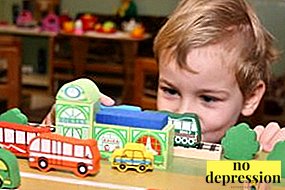Having two higher educations in completely different areas, I got an interesting and useful experience of how to choose a profession, which I now want to share. I acquired my first specialty without any hesitation at the request of my parents, having failed to defend my point of view. And after graduating from the institute in due time, a year later I felt the negative effect of such a “choice”.
When it became clear that I would have to go back to study for such a long time, I approached the choice of profession very seriously. I read books on vocational guidance, passed various tests, communicated with a psychologist and underwent a “dive into reality” with the help of several specialists.
The content of the article:
Examine yourself
Choose interesting professions from the list
Immersion into the reality of the profession
Psychologist's comment
In the end, I went to study a specialty that was interesting to me most of my life, could bring real practical benefits, and which impressed my temper. And along the way, I formulated a certain general plan by which one can choose a profession with full responsibility.
The first step is to study yourself.
 The choice of profession is a crucial step. No matter how beautiful the specialty is, if it does not suit you, the work will not bring either joy or profit. You need to start the search from yourself to reveal all your inclinations, hobbies and contraindications. Each person has such moments in life that he cannot tolerate, no matter how hard he tries.
The choice of profession is a crucial step. No matter how beautiful the specialty is, if it does not suit you, the work will not bring either joy or profit. You need to start the search from yourself to reveal all your inclinations, hobbies and contraindications. Each person has such moments in life that he cannot tolerate, no matter how hard he tries.
Important! It contraindications to work are of great practical importance. If you are tired of long communication with people, then the work of a teacher, for example, will simply ruin your health, psychological and physical.
The following sources can help in this regard:
- tests to identify the characteristics of the character and personality;
- communication with a practicing psychologist.
Now on the bookshelves a lot of literature is devoted to choosing one’s life path - including how to choose a profession in one’s life, but don’t trust any book you’ve taken. It is necessary to choose several reputable publications and collections of tests, and rely on the cumulative result of the study. And to begin with, avoid tests, at the end of which ready-made professions are offered to choose from a dozen of answers. Your task at first is to study yourself, your own characteristics without orientation to the specialty.
For example, my first test when choosing a profession said that a specialty of a teacher or actress would suit me. And if I didn’t like the role of a teacher initially, then I simply couldn’t imagine myself on stage. And in the next sections there were registered professions that I wanted to try on myself so much!
But after a more careful choice of literature, I learned a lot about myself and even understood why I could not work in my first specialty. Having obtained this basic knowledge, I went to a psychologist in order to be convinced of their objectivity. A psychologist will help you understand which traits are inherent in your personality initially, and which are the fruits of education. If necessary, you can correct yourself before performing the next step.
The choice of profession - the theory
And here you are faced with lists of all professions existing in the education and labor market. Some of them you will remove from the list immediately, as contraindicated for your personality and absolutely not interesting.
Important! It is very convenient to really make a list of specialties, and in the form in which they appear on the labor market. Record even the most absurd options, ask friends and relatives.
How to work with the list:
- Sit back in your free time, in silence.
- Cross off first those professions that do not suit you. This job is easy, maybe it will even make you smile or yawn. Penguin lifter, sushi chef, dancer - by doing this, you tune in to a serious tune and get ready to more thoughtfully scan other options.
- Now cross out those specialties that you like in theory, but have significant drawbacks.
- Go through the list so several times, leaving only those professions that you really like.
 What to do next with this list, and how it can help make the right choice of profession? We understand further.
What to do next with this list, and how it can help make the right choice of profession? We understand further.
As a result, you will be left with a small list of those activities that suit you best. How to understand what they are? Mentally imagine the situation in which you came to a small island, and there only one of the works. Does this thought cause only positive or negative emotions? Of course, we need positive.
And for each remaining profession write down the training opportunities. What institutions teach this or similar? How much is it? What city will have to live? What are the forms of training? Do not be lazy to call schools and make a realistic database. Now you see what kind of specialty in practice you can get, and for what you need to go to distant distances, selling all property for payment.
After such work, you will have a very short list of one, two or three options left on your hands. And at each stage of work, psychologists advise you to try to isolate yourself as much as possible from your thoughts, whether parents, friends, a loved one will like the specialty. Often the environment is not the best way to influence our choices.
Practice: what is "immersion into reality"?
What I did after the first two steps and determined my future. I am proud of this idea, although it does not belong to me. It was first used in very wide practice by German psychologists.
When the choice of profession is made, you need to search in the environment of a person with the same specialty working in it. Your task is to ask for the closest contact with him. Whether he agrees on the goodness of his soul or takes a fee for it - try to convince him to help you.
Sometimes it can be a long conversation, during which a person will tell you about their everyday lives. At best, you will have the opportunity to come to his workplace and sit in the corner all day, or even a few, absorbing the details of everyday life. You can learn a lot about the specialty - salary prospects, bonuses, interesting moments - but from gray days of everyday life it will take shape year after year.
 Learn about them as much as possible, and if they do not scare you, the choice is made. If at the thought of such a life becomes uncomfortable, grasp the next specialty on your mini-list. For example, I abandoned the idea of working in a hospital not at the sight of blood, but simply by estimating the amount of paper fuss for a day, after spending only four hours at a regular reception.
Learn about them as much as possible, and if they do not scare you, the choice is made. If at the thought of such a life becomes uncomfortable, grasp the next specialty on your mini-list. For example, I abandoned the idea of working in a hospital not at the sight of blood, but simply by estimating the amount of paper fuss for a day, after spending only four hours at a regular reception.
Of course, the described strategy will take more than one day, but in the end you will go to study in the area that suits you completely and does not carry unpleasant surprises. By choosing a profession in this way, you have a beneficial effect on your future for many, many years.
Galina, St. Petersburg



